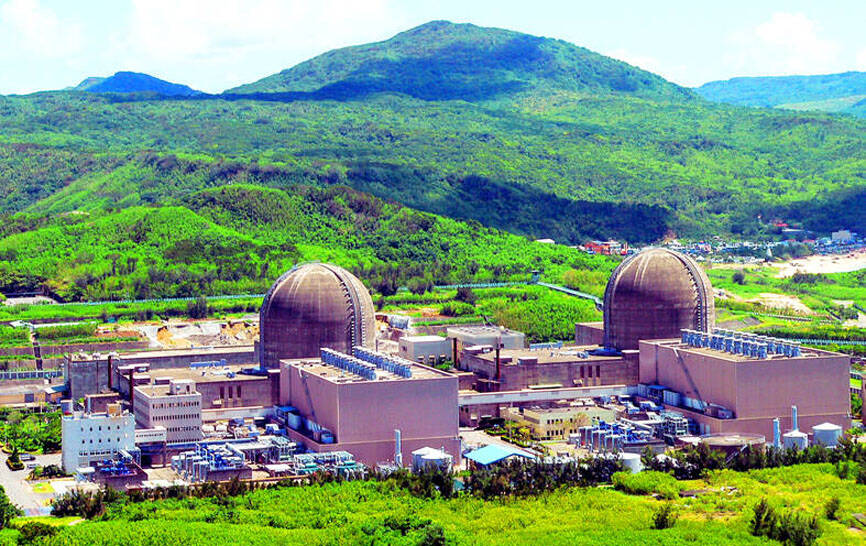The Nuclear Safety Commission (NSC) has proposed an amendment to the Regulations on the Application for an Operating License of Nuclear Reactor Facilities (核子反應器設施運轉執照申請審核辦法), which would require nuclear power plants to submit plans to maintain safe operations if they seek to extend their operational licenses.
The change was proposed after the legislature in May passed an amendment to Article 6 of the Nuclear Reactor Facilities Regulations Act (核子反應器設施管制法), which requires nuclear power plant operators to apply for a license renewal if there is need to continue operation after the license expires. The renewed license would be valid for 20 years. It was made public on Aug. 1, ahead of the referendum on reactivating the Ma-anshan Nuclear Power Plant in Pingtung County, which was decommissioned on May 17.
The new regulations, which are open to public input for two months, would require nuclear facility operators to apply for a renewal of the license and submit a restart plan, the commission said.

Photo courtesy of the Taiwan Power Co
They must also submit radiation assessment and earthquake safety reports, it added.
The final version of the regulations could be promulgated in October, it said.
Under the regulations, Taiwan Power Co (Taipower) can launch a safety inspection of the Ma-anshan Power Plant and conduct a peer review to assess if the plant satisfies the conditions necessary for reactivation. The assessment, along with the timeline, and a cost and benefit analysis of restarting the plant, must be submitted to the NSC for review, the commission said.
The restart plan must list several items, including the current status of facilities, a personnel allocation and training plan, a periodic facility maintenance and inspection plan, quality assurance and audit plans, as well as plans for restoring regulatory compliance and operational documentation.
Taipower would likely spend a considerable amount of time working on the personnel allocation and training plan, and the facility maintenance and inspection plan, as the number of workers at the plant has been reduced since its decommissioning, an NSC official said.
The emergency core cooling system does not require maintenance at the moment because the No. 3 nuclear reactor has no fuel. However, if the reactor is to be restarted, would be necessary to confirm that the related systems could be restored to their proper functioning, the official said.
Asked how long it would take to review the license renewal application, the official said it would depend on the time that Taipower needs to gather all the required documents, adding that the NSC had the experience of reviewing the license renewal application of the Jinshan Nuclear Power Plant.
Regarding the radiation and earthquake-resistance assessment, the official said that Taipower by default should conduct geological surveys based on new seismic data and reinforce its nuclear facilities accordingly, adding that the power company also conducted a comprehensive safety inspection after the nuclear incident at the Fukushima Dai-ichi nuclear power plant on March 11, 2011.
The commission also hopes Taipower would revisit the measures that it had taken to bolster nuclear facilities against earthquakes and check that they still meet government standards, the official said.
Most important is that the nuclear power plant could continue to operate safely and is open to scrutiny from the public, they said.
The new regulations also require the state-run power firm to meet radiation standards set by the Nuclear Reactor Facilities Regulations Act, Ionizing Radiation Protection Act (游離輻射防護法), the Nuclear Materials and Radioactive Waste Management Act (放射性物料管理法) and the Nuclear Emergency Response Act (核子事故緊急應變法).

Taiwan is to commence mass production of the Tien Kung (天弓, “Sky Bow”) III, IV and V missiles by the second quarter of this year if the legislature approves the government’s NT$1.25 trillion (US$39.78 billion) special defense budget, an official said yesterday. Commenting on condition of anonymity, a defense official with knowledge of the matter said that the advanced systems are expected to provide crucial capabilities against ballistic and cruise missiles for the proposed “T-Dome,” an advanced, multi-layered air defense network. The Tien Kung III is an air defense missile with a maximum interception altitude of 35km. The Tien Kung IV and V

The disruption of 941 flights in and out of Taiwan due to China’s large-scale military exercises was no accident, but rather the result of a “quasi-blockade” used to simulate creating the air and sea routes needed for an amphibious landing, a military expert said. The disruptions occurred on Tuesday and lasted about 10 hours as China conducted live-fire drills in the Taiwan Strait. The Civil Aviation Administration (CAA) said the exercises affected 857 international flights and 84 domestic flights, affecting more than 100,000 travelers. Su Tzu-yun (蘇紫雲), a research fellow at the government-sponsored Institute for National Defense and Security Research, said the air

A strong continental cold air mass is to bring pollutants to Taiwan from tomorrow, the Ministry of Environment said today, as it issued an “orange” air quality alert for most of the country. All of Taiwan except for Hualien and Taitung counties is to be under an “orange” air quality alert tomorrow, indicating air quality that is unhealthy for sensitive groups. In China, areas from Shandong to Shanghai have been enveloped in haze since Saturday, the ministry said in a news release. Yesterday, hourly concentrations of PM2.5 in these areas ranged from 65 to 160 micrograms per cubic meter (mg/m³), and pollutants were

Taiwan’s armed forces have established response protocols for a wide range of sudden contingencies, including the “Wan Chun Plan” to protect the head of state, the Ministry of Defense (MND) said today. After US President Donald Trump on Saturday launched a series of airstrikes in Venezuela and kidnapped Venezuelan President Nicolas Maduro, concerns have been raised as to whether China would launch a similar “decapitation strike” on Taiwan. The armed forces regularly coordinate with relevant agencies and practice drills to ensure preparedness for a wide range of scenarios, Vice Minister of National Defense Hsu Szu-chien (徐斯儉) told reporters before a